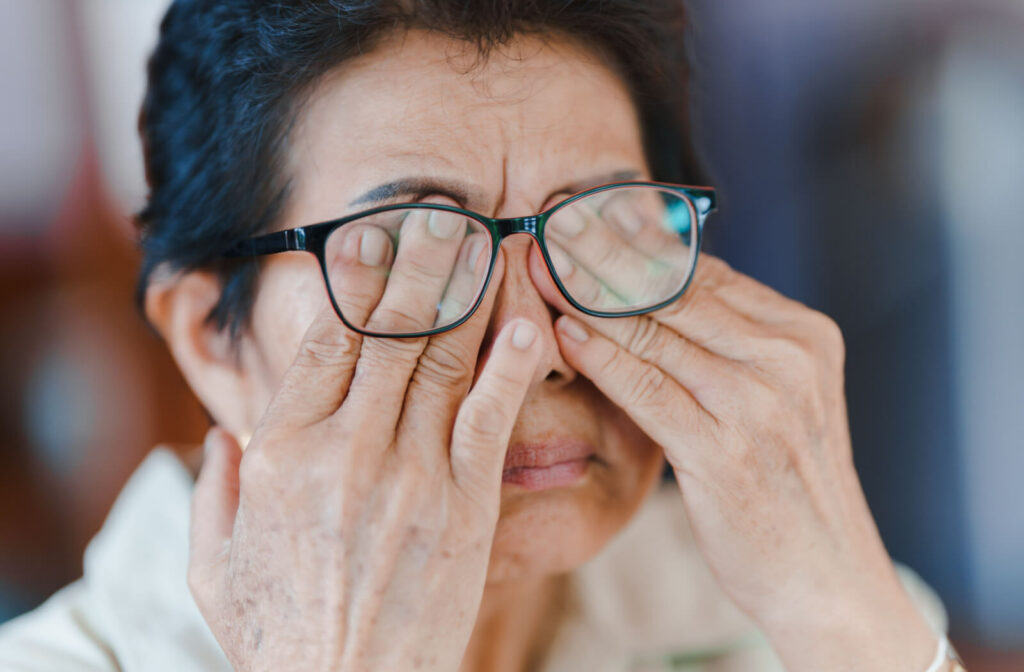Cataracts are a common age-related eye condition that can affect your vision. Apart from age, they can also be caused by other factors.
Double vision is a potential symptom of cataracts. If you notice double vision or other vision changes, visit your eye doctor. Comprehensive eye exams can help detect cataracts in their early stages to prevent progression and protect your vision.
All About Cataracts
Cataracts can occur when the clear lens inside your eye that helps to focus light becomes cloudy or opaque. This clouding can affect your daily life and make it increasingly difficult to do activities such as reading or driving.
Cataracts usually develop slowly in one or both eyes, leading to vision loss over time. Vision changes caused by cataracts can sometimes be treated during their early stages, but the only way to cure cataracts is to have surgery to remove the cloudy lens.
Causes of Cataracts
Cataracts can occur with age when the proteins in your eye’s lens start to break down and clump together, creating clouding on your lens. In addition to age, other causes of cataracts can include:
- A family history of cataracts
- Diabetes
- Eye injury
- Eye surgery complications
- Taking steroids
- Radiation treatment for cancer or other diseases
Factors that can speed cataract formation include:
- Smoking
- Drinking alcohol
- Spending time in the sun without sunglasses
Symptoms of Cataracts
Cataracts can cause the following symptoms:
- Blurry or dim vision
- Difficulty seeing in low light or at night
- Light sensitivity
- Problems with glare
- Seeing halos around lights
- Difficulty reading
- Frequent optical prescription changes
- Fading or yellowing of color vision
- Double vision
Double Vision with Cataracts
Double vision, also known as diplopia, is a condition where you see two images of a single object instead of one. Double vision can be constant or intermittent and occur in one or both eyes. It can be a source of significant discomfort and can make it difficult to perform everyday tasks.
Cataracts can cause double vision. The lenses in your eyes are usually flexible and can change shape to focus incoming light onto your retina (the light-sensitive tissue at the back of your eye). However, when your lens becomes cloudy, it can cause light to scatter, leading you to see two or more images of a single object. Sometimes your double vision can go away as the cataract gets bigger.
Treatment for Cataracts
In the early stages of cataracts, treatment may include prescription glasses or contact lenses to help you see clearly. Other things you can do to manage cataracts in the early stages can include:
- Using brighter lights at home or work
- Wearing anti-glare sunglasses
- Using magnifying lenses for reading and other activities
When cataracts start affecting your quality of life and your ability to carry out daily tasks, your eye doctor may recommend surgery.
Cataract surgery involves removing a clouded lens to replace it with an artificial or intraocular lens (IOL). Cataract surgery is a safe and effective procedure that can restore clear vision and reduce or eliminate double vision caused by cataracts.
Other Causes of Double Vision
It’s important to note that not all cases of double vision are related to cataracts. There are other causes of double vision, including problems with eye muscles, nerve damage, or underlying medical conditions, such as:
- Brain tumors
- Corneal swelling
- Multiple sclerosis
- Traumatic brain injuries
If you are experiencing double vision, it’s important to visit your eye doctor to determine the underlying cause and find an appropriate treatment.
Taking Care of Your Eye Health
There is no sure way to prevent cataracts, but there are measures you can take to reduce your risk and maintain good eye health, including the following:
- Regular eye exams: Schedule regular checkups with your eye doctor to monitor your eye health and detect any issues early. Your doctor can recommend an exam frequency based on your family history and risk for developing cataracts.
- Protect your eyes: Exposure to UV light can contribute to the development of cataracts. Wear sunglasses with UV protection and use safety glasses or goggles when necessary to prevent eye injuries.
- Quit smoking: Smoking has been linked to an increased risk of developing cataracts, so quitting smoking can benefit your overall eye health.
- Eat a healthy diet: Incorporate fruits and vegetables rich in vitamins, nutrients, and antioxidants into your diet to support your eye health.
- Manage health problems: Ensure you receive treatment for, and take steps to manage, health conditions that can increase your risk of cataracts.
- Reduce your alcohol consumption: Excessive alcohol consumption can increase the risk of cataracts.
Protecting Your Vision & Eye Health
Cataract-related double vision is treatable with cataract surgery, but it’s important to find the specific cause of your double vision and get appropriate treatment for that condition. If you’re experiencing double vision, book an appointment with Pack & Bianes Optometry.
Our eye exams use advanced diagnostic technology to detect and determine the underlying cause of your symptoms. With early intervention and treatment, we can help prevent long-term vision problems caused by conditions like cataracts.



